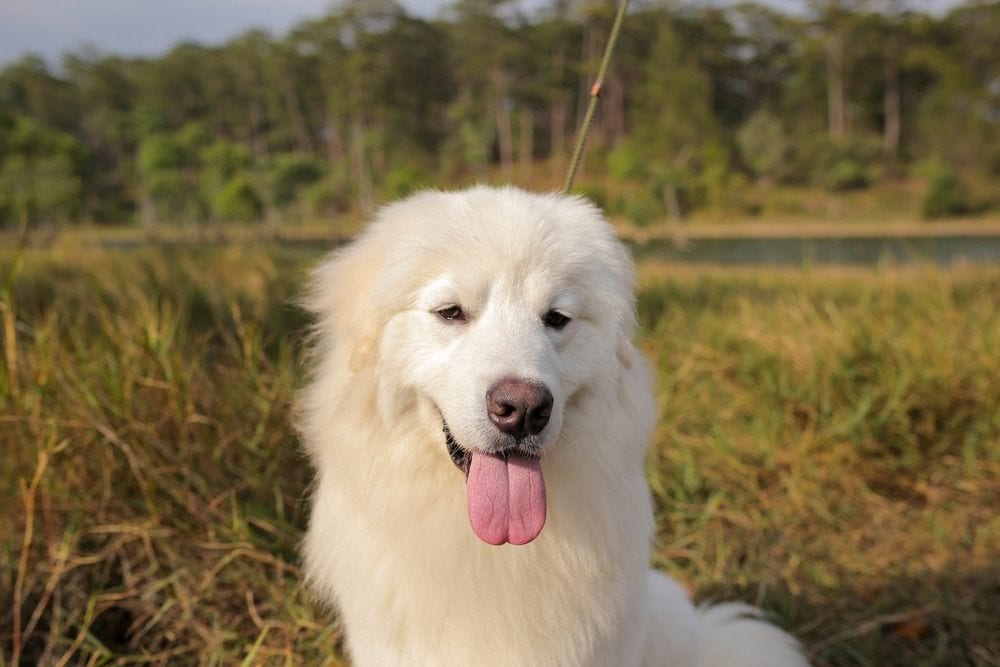Golden Sammy (Golden Retriever & Samoyed Mix): Info, Pictures, Facts

Updated on

| Height: | 21–24 inches |
| Weight: | 50–75 pounds |
| Lifespan: | 10–15 years |
| Colors: | Varying shades of cream, white, and red |
| Suitable for: | Families of all sizes, even those with small children |
| Temperament: | Loyal, well-mannered, intelligent, easily trainable, gets along with other pets |
What do you get when you cross one of the most iconic dogs ever (Golden Retriever) with an ancient sled dog (Samoyed)? The Golden Sammy! Or Samoyed Golden Retriever Mix, of course.
The Golden Sammy is one of the most well-mannered and magnificently lovable dog breeds you’ll ever meet. And they’re absolutely great with children. So, if you’re looking for a family dog, a Golden Sammy might just be the right pooch for you.
They’re not super low-maintenance, but it’s not very difficult to care for them either. Golden Sammies don’t require excessive exercise and don’t need daily brushing. All in all, they’re a wonderful breed if you’re looking for a new addition to the family.
Golden Sammy Puppies
Adding a Golden Sammy to your family might seem like the best thing ever. And it might be…if you can properly care for them. Before searching for a breeder, ask yourself a few questions.
- Do you have the time to dedicate to exercise and play?
- Can you keep up with this long-haired rascal and meet their grooming needs?
- Can you afford their food and veterinary bills?
- And are you ready to accept a sweet, loving, and loyal pup into your home?
If you can answer yes to all of these, you’ve taken the first steps toward becoming a Golden Sammy parent.
3 Little-Known Facts About the Golden Sammy
1. They have a storied pedigree.
The Golden Sammy was first bred in the 2000s, so they don’t have much history as their parent breeds yet. But each of its parents does. The Golden Retriever can be traced back to 18th-century Scotland1. They were first bred by Dudley Marjoribanks (A.K.A. Lord Tweedmouth) for the purpose of swimming long distances to retrieve ducks and other waterfowl shot while hunting. Golden Retrievers have since been among the most popular dog breeds of all time.
The Samoyed side of the Golden Sammy goes back much further. Samoyeds are named after the nomadic Samoyed peoples of Siberia. They were working dogs used to pull sleds, herd reindeer, and assist in hunting expeditions. It’s one of 13 breeds to be so genetically divergent from other modern breeds2. Samoyeds only made their way out of Siberia at the end of the 19th century and were recognized as an official breed in the US in 1923.
2. Golden Sammies are not heavy barkers.
Both the Samoyed and the Golden Retriever are relatively quiet dogs, so it only goes to figure that the Golden Sammy doesn’t bark too much either. This is an awesome quality for those of you living with neighbors nearby. They’re not going to cause too much disturbance. But when you do hear them barking, it could be a sign to investigate, as they usually only bark when absolutely necessary.
3. They’re natural working dogs.
Both parents of a Golden Sammy are working dogs, and it’s not uncommon to see Golden Sammies revert back to instinctual ways. You may see them trying to act as herders and protectors around children and help pull you along while attached to a leash.

Temperament & Intelligence of the Golden Sammy 🧠
Golden Sammies are some of the most chill dog breeds around. They’re very tolerant of other dogs, pets, and children. And they’re not afraid to show affection. You’ll find your Golden Sammy extremely loyal and dedicated to their family—after all, their Samoyed lineage were pack dogs.
Are These Dogs Good for Families? 🏡
Samoyed Golden Retriever Mixes are among the ultimate family dogs. Their mild-mannered temperament makes them exceptionally great with kids. And their super-high tolerance is only rivaled by their loyalty. Once your Samoyed Golden Retriever Mix has accepted you into their pack, you’re family forever.
Does This Breed Get Along with Other Pets? 🐶 😽
These lovable furballs even get along with other animals. They are a very sociable breed. This may actually need a bit of regulation when they’re younger in order to train them from smothering every person or pet with affection.
Things to Know When Owning a Golden Sammy
When it comes to owning a Golden Sammy, there are a few things specific to this breed you’re going to want to watch out for.
Food & Diet Requirements 🦴
These pups just love to eat! And if you’re not careful, they may trick you into giving them more than they really need. 2.5 cups of high-quality dog chow should be enough food for a healthy Golden Sammy diet.
As we’ll discuss later, this breed is more susceptible to joint issues. And those can be compounded through unhealthy weight gain or obesity—so keep your eye out for this.
Exercise 🐕
Now, it may seem like this breed is going to need a lot of exercise. It comes from a true working dog lineage from waterfowl retrieval to sled pulling and reindeer herding. But the Golden Sammy doesn’t need too much physical activity—40 minutes a day is really about it.
However, they are going to need mental exercise. The fact that they’re so intelligent means they’ll get bored without proper stimulation. And boredom can lead to naughtiness such as chewing and digging. Letting them explore on daily walks or teaching them hide-and-seek games can really benefit your Golden Sammy.

Training 🦮
When compared to other breeds, the Samoyed Golden Retriever Mix takes to training much easier and faster due to their intelligence. However, you will want to take the time to train them. When left untrained, the Samoyed instincts will kick in. They won’t become aggressive or anything like that. But they may attempt to herd unruly children or pull you while leash walking.
Grooming ✂️
These are long-haired dogs, and that means there will be shedding. You’re going to need to be hyper-vigilant to keep your house hair-free. However, this can be minimized by brushing them three times a week.
Another important area of grooming for the Golden Sammy is its ears. They have folded over ears which can trap excess moisture inside the ear canal. You’ll want to thoroughly clean and dry their ears regularly—especially after a jaunt in the rain or dip in the pool/bath.
- Also see: Best Dog Shampoos – Reviews & Top Picks
Health and Conditions ❤️
As far as their health is concerned, they’re actually relatively healthy when compared to other dogs. Their lineage comes from rather problem-free breeds. However, there are two major areas you should be concerned with.
- Retinal dysplasia — Can cause full or partial blindness
- Hip and elbow dysplasia — Leads to progressive arthritis
These are often caused by hereditary means. But if you’ve picked up your Golden Sammy from a reputable breeder with parentage records, you’ll be armed with more info on whether your pup will be more vulnerable.
Other than that, they still have a low risk of contracting minor illnesses common among dogs such as diabetes, glaucoma, cataracts, or deafness.
- Entropion
- Pulmonic Stenosis
- Deafness, Cataracts
- Glaucoma
- Diabetes
- Hypothyroidism
- Histiocytosis
- Retinal Dysplasia
- Hip and Elbow Dysplasia
Conclusion
If you’re looking for a loving addition to your family, a Golden Sammy could be a great fit for you. They’re smart, loyal, and easily trained—so even first-time dog owners can feel comfortable with them.
The biggest difficulties with owning a Samoyed Golden Retriever Mix is keeping up with their grooming and keeping them mentally stimulated. But if you can dedicate the time necessary to grooming and active engagement, you might just find that you’ve acquired a friend for life.
See Also:
- Samoyed Chow Chow Mix: Info, Pictures, Characteristics & Facts
- Samoyed Lab Mix: Pictures, Care Guide, Temperament & Traits
Featured Image Credit: BuiPhuKhanh, Shutterstock













